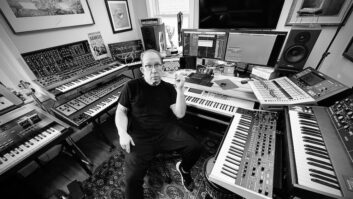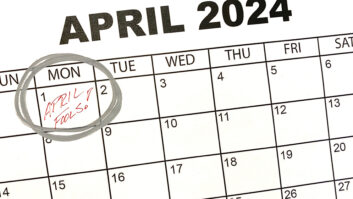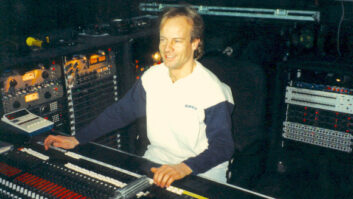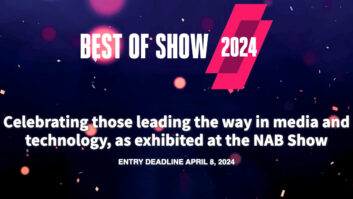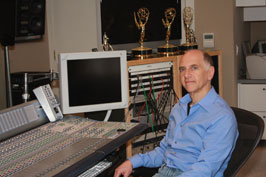
Peter Cole at home with his Emmy Awards
The technological revolution has given rise to an entrepreneurial revolution. As proof, I offer you my own ‘hood in Studio City, a name that, I’m discovering, describes this stretch of the Valley better than it did when the town was established in the 1920s, when Max Sennett was making Keystone Kops films on his lot off Radford Avenue (now CBS Studio Center).
A mere five blocks away from me, right on my primary jogging route of the past 25 years, Peter Cole is working on a variety of projects in his high-end post-production studio, which just happens to be a 20-foot walk from the back door of his house. Yes, it’s a converted garage, like so many others in this neck of the woods.
“This is the extent of my client services,” Cole quips, placing a mug of well-brewed coffee on the table in front of the client couch where I’m sitting. He takes his usual station in a rolling ergonomic chair that sits in front of the studio’s hub, a 24-fader Digidesign ICON D-Command. He’s wearing his own variation of the SoCal independent contractor’s year-round wardrobe: cargo shorts, high-mileage running shoes and a T-shirt bearing a drawing of a glass above the legend, “Half Full.”
To the left and just behind the board are his three Emmy statuettes; to the right, standing guard in front of one of two LCD TVs, is a pair of miniature robots from the animated series Futurama. Cole did post for the show, and he’s presently working on the second of four direct-to-DVD features. He’s also worked on such shows as The Simpsons, Northern Exposure and VH1’s Behind the Music, as well as a number of feature films, and he did time at Sunwest, the Post Group, Skywalker Sound and Post Logic before going solo in the early ’90s.
When he’d finished construction of the space, Cole brought in Bob Hodas to tune it with a Meyer SIM system. It was Hodas who suggested the Bag End bass trap that’s sitting on the JL Audio woofer in the right corner, the two serious-looking black pieces separated by three whimsical tennis balls. With Hodas’ expert help, the proud owner got the room “totally dialed in.”
Cole’s studio is the physical manifestation of his recently formed company, Before Noon Post (www.beforenoonpost.com). But Before Noon’s borders extend far beyond the dimensions of this one-room space — in a conceptual or, okay, a virtual sense, as Cole variously characterizes it, Before Noon is a community, an interconnecting series of “strategic relationships” and, less formally, “friends and family.”
“Before Noon can be this room, it could be me ghost-mixing for another facility, it could be me corralling some of the major talent in town to do a feature film,” he explains. “I’ve been doing this for 30 years; I know technically how it all works and I have friends who are also very experienced.”
Here, in a nutshell, is the recipe Cole has come up with: “You take a bunch of self-motivated people, many of them with their own equipment, you put them together with sole providers with really high-end studios, and, ‘Let’s make a TV show.’ It’s all done extremely well, the producers are really happy, the price point’s decent and the bonus is I’m a union signator, so I can package it all.”
Cole is a self-described “total gear slut,” and his studio bears out his assertion. “I use a CEDAR DNS 2000 for noise reduction; it’s a great piece of hardware that’s controlled by a plug-in inside of Pro Tools. I have more plug-ins than any human should be allowed to have. I recently picked up a plug-in that emulates what’s referred to as ‘futz.’ Called Speakerphone by Audio Ease, this software can emulate all kinds of devices with funky-sounding speakers and place them in any acoustical environment; it’s a great little tool. There’s another company I work with called McDSP that makes great plug-ins. I’ve got every tool I could possibly need right here.”
He discovered Pro Tools — or Sound Tools as it was called when Digidesign first released the system in 1989 — while working at the Post Group, and, unlike many of his peers, Cole “got it right away,” he says. “When I was doing Max Headroom back in the mid-’80s, we had four 24 tracks locked up with another mixing console in the back of the room, and it was like a big to-do,” he remembers. “Today, I have 192 tracks going in succession, it’s all being done in 5.1, I can push a button and feed it to that TV speaker and emulate a broadcast chain. I mean, I can do these insane things, I can give the producers anything they want and I’m at home.
“At Pro Logic, I had my own 16-channel Pro Tools system that I’d use in all my sessions,” Cole recalls. “I knew this was a better tool, and I learned the power of this thing. Then I took the leap of faith: I had an opportunity to do a series, and I rented space in Burbank and set up a little office, put Sonex on the walls, got my Mackie HUI out, updated my Pro Tools to 32 channels and mixed this little kids’ show. That’s where this experiment started. The next year I took it all home and mixed four TV series in what is now my daughter’s bedroom before building the room you’re sitting in.”
Cole wound up getting three Emmys for his work on Pee-Wee’s Playhouse. In keeping with his maverick character, he named his company Pirate Post. Before Noon represents a naturally expanding evolution of that early adoptive, entrepreneurial impulse.
While so many of his friends were brutalized by the recently settled WGA strike, Cole found himself busier than ever. “I’ve always believed that my job security comes from my skills, my people skills and my ability to do the job well. And when these strikes happen, those of my friends who have the entrepreneurial spirit are figuring out that if the clients at these big audio facilities are directly interfacing with them, then they don’t necessarily need the facility; the facility needs them. That’s what the transition is here. The talent goes to these major facilities, and says, ‘We have a major project, and we might want to use your facility.’ So the client that belonged to the facility now belongs to the talent.”
On this point, Cole is a signatory of IATSE Local 700, and the health insurance offered by the union is excellent, which makes the old entrepreneurial spirit a lot easier to adopt.
”It’s about getting off the grid,” Cole says of the path he’s chosen, “because I don’t necessarily subscribe to the way things are being done in Hollywood as the most efficient or the best way — or the best way for me. I’ve sat on dub stages and in front of million-dollar consoles, and I thought, ‘This stuff’s history.’ This was years ago. So I’ve always tried to stay in front of it. What I’m doing is nothing revolutionary. Anyone can do the exact same thing that I’m doing, and they will. I just hope to be one of the first kids on the block to do something like this and to pull it off.”
Send L.A. news to [email protected].

